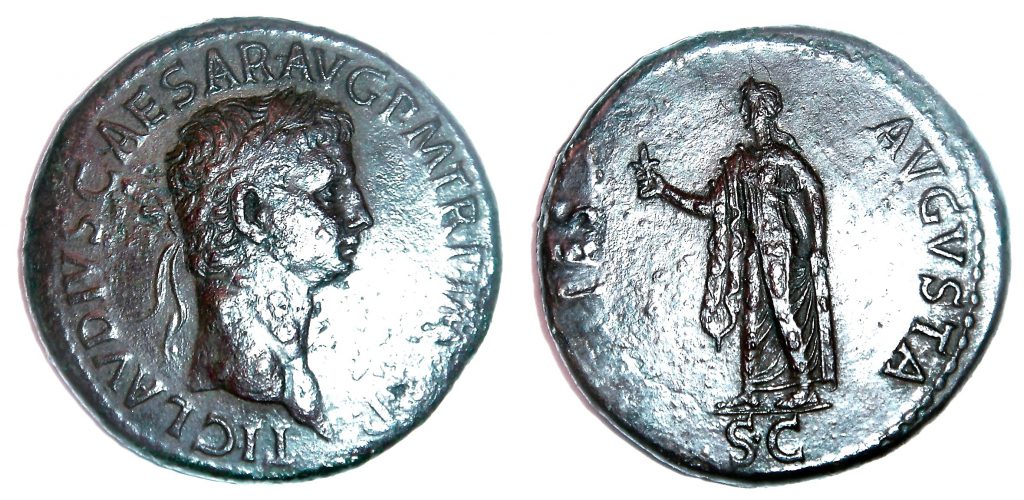October 13, 2016, by Will Leveritt
On this day in AD 54, the Roman emperor Claudius died at Rome
Text by Lydia Kilbey
Well known from Robert Graves’ novels and television drama (I, Claudius and Claudius the God), and one of the most well-known Julio-Claudians, Claudius is remembered for his conquest of Britain, physical disability and his unfortunate luck with women.

AE sestertius of Claudius. Obv. has laureate head of emperor r., TI CLAVDIVS CAESAR AVG PM TR P IMP PP. Rev. has Spes left holding flower; SPES AVGVSTA, SC in ex. Image courtesy Lauren Cole.
Tiberius Claudius Drusus (later Ti. Claudius Nero) was born at Lugdunum (modern day Lyon, France) in 10 BC. Through his maternal grandmother, Octavia Minor, he was a great-nephew of Augustus. His father, Drusus, and older brother, Germanicus, both had great military reputations.
Despite being a member of the imperial family, Claudius’ physical disability and the ill-will he had generated by attempting to write an unvarnished account of the civil wars that had brought his great-uncle to power meant that efforts were made to hide Claudius from the public eye. He was denied the chance to pursue a public career or hold any political office until his nephew Caligula (who was emperor at the time) made him his co-consul in AD 37.
After the assassination of Caligula in AD 41, Claudius was proclaimed emperor by the Praetorian Guard. He paid them the huge sum of 15,000 sesterces each. He was the first to offer such a donative and in so doing set a precedent his successors were obliged to follow.
Although he lacked the necessary political experience, upon his accession Claudius proved himself to be a capable administrator of the Roman Empire. He set about improving the city through public works. These included three aqueducts: the Aqua Claudia, the Anio Novus and repairs to the Aqua Virgo. He also built up the port at Ostia, in order to prevent grain shortages in Rome.
Claudius’ greatest success was his conquest of Britain in AD 43. The Senate had been reluctant to accept Claudius as emperor in AD 41 and tensions continued between the two, especially due to Claudius’ insistence on using freedmen in his administration.
The emperor was under pressure to improve his political and military image. Despite Augustus’ wishes that the empire should not be extended further, Claudius sent four legions to conquer Britain. It was a successful campaign: Claudius created the province of Britannia and was awarded a triumph. To further commemorate the event, he changed his son’s name to Britannicus.
One of the main ancient criticisms of Claudius is that he was easily manipulated, especially by his wives. Each marriage ended with divorce and Claudius had four wives during his lifetime: Plautia Urgulanilla, Aelia Paetina, Valeria Messalina and the younger Agrippina.
Marrying his niece, Agrippina, was considered highly immoral and Claudius was obliged to change the law so that it was no longer illegal. They married in AD 49. The historian Tacitus states that before they were even married, Agrippina “already possessed a wife’s power”, and that she manipulated Claudius into adopting her son, the future emperor Nero. Shortly afterwards, Nero was named Claudius’ successor, rather than his own son Britannicus.
Most of the ancient sources believe that Claudius died through poisoning, though the culprit/s are unknown. One story is that Agrippina, in her desperation for Nero to become emperor, poisoned a dish of mushrooms, which happened to be the emperor’s favourite. Claudius’ taster and doctor have both been accused of administering poison. On the other hand, others such as Seneca the Younger, believe he died of natural causes.
Whatever the precise cause, Claudius died at Rome on 13 October AD 54, aged 63 and was succeeded by Nero. He was deified after his death. One of Claudius’ main critics, Seneca, wrote an unflattering satire about the emperor’s deification, called the Apocolocyntosis (the ‘Pumpkinification’ of Claudius).
No comments yet, fill out a comment to be the first

Leave a Reply